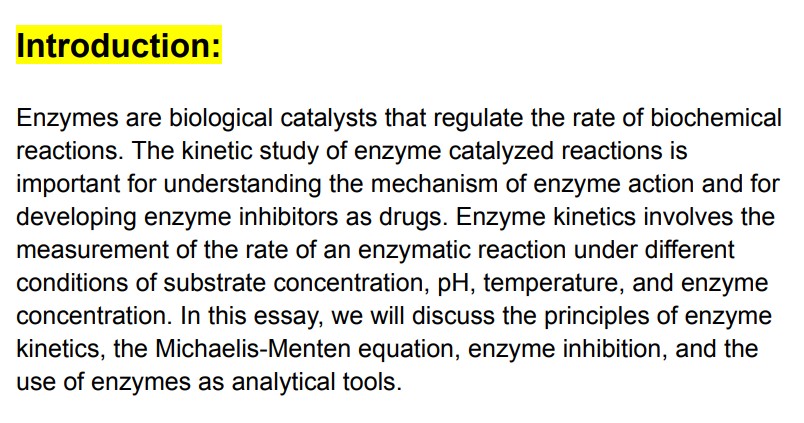Enzyme Kinetics and Its Importance
Summary:
The essay discusses the principles of enzyme kinetics, including the Michaelis-Menten equation, enzyme inhibition, and the use of enzymes as analytical tools. Enzyme kinetics involves measuring the rate of an enzymatic reaction under different conditions of substrate concentration, pH, temperature, and enzyme concentration. Enzyme inhibitors can be reversible or irreversible and can bind to different sites on the enzyme. Enzymes are used as analytical tools in biochemistry and clinical chemistry to detect and quantify molecules in biological samples. Understanding enzyme kinetics is crucial for developing new drugs, designing enzyme-based industrial processes, and developing new biosensor technologies.
Excerpt:
Enzyme Kinetics and Its Importance
“Mastering Enzyme Kinetics: Understanding the Mechanisms of Enzyme Action and their Applications”/ Essay on “Enzymes Kinetics “
Introduction:
Enzymes are biological catalysts that regulate the rate of biochemical reactions. The kinetic study of enzyme-catalyzed reactions is important for understanding the mechanism of enzyme action and for developing enzyme inhibitors as drugs. Enzyme kinetics involves the measurement of the rate of an enzymatic reaction under different conditions of substrate concentration, pH, temperature, and enzyme concentration. In this essay, we will discuss the principles of enzyme kinetics, the Michaelis-Menten equation, enzyme inhibition, and the use of enzymes as analytical tools.
Principles of Enzyme Kinetics:
Enzyme kinetics is based on the law of mass action, which states that the rate of a chemical reaction is proportional to the product of the concentrations of the reacting substances. For an enzyme-catalyzed reaction, the rate is proportional to the concentration of the enzyme-substrate complex. The basic steps of an enzyme-catalyzed reaction are:
1. Formation of the enzyme-substrate complex
2. Conversion of the substrate to product
3. Release of the product and regeneration of the enzyme
The rate of the reaction depends on the rate of each of these steps. The formation of the enzyme-substrate complex is often the rate-limiting step in enzyme-catalyzed reactions.


Reviews